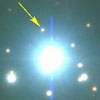|
Sunday:
August 10, 2003 | |
0329 GMT |
 |
'Winking star' started winking only recently
Last year, astronomers announced that they had discovered a "winking" star -- a star known as KH 15D that undergoes a regular, long-lasting (~20 day) eclipse every 48 days. Spurred on by those findings, the past behavior of KH 15D has been examined using sky photographs taken during the first half of the 20th century and stored in the Harvard archives.
 FULL STORY FULL STORY
 |  |

|
 |
|
Saturday:
August 9, 2003 | |
0335 GMT |
 |
Nature of comets reconsidered
The long-held perspective that comets are pristine remnants from the formation of the solar system has evolved from the prevailing views of 30 years ago, finds a planetary scientist in a newly published paper.
 FULL STORY FULL STORY
 |  |

|
 |
Too close for comfort: A view of globular cluster
This Hubble Space Telescope view of the core of one of the nearest globular star clusters, called NGC 6397, resembles a treasure chest of glittering jewels. The cluster is located 8,200 light-years away in the constellation Ara.
 FULL STORY FULL STORY
 |  |

|
 |
|
Friday:
August 8, 2003 | |
0703 GMT |
 |
Shuttle return-to-flight task group outlines plans
The co-chairman of a panel charged with assessing how well NASA meets the intent of recommendations from the Columbia Accident Investigation Board said Thursday he's not sure the agency will have time to implement critical management changes before shuttle flights resume next year.
 FULL STORY FULL STORY
 STS-107 STORY DIRECTORY STS-107 STORY DIRECTORY
 |  |

|
 |

Coverage for subscribers only:
 VIDEO: WATCH ENTIRE DICK COVEY NEWS CONFERENCE QT VIDEO: WATCH ENTIRE DICK COVEY NEWS CONFERENCE QT
 AUDIO: LISTEN TO THE TASK GROUP'S FIRST PUBLIC MEETING QT AUDIO: LISTEN TO THE TASK GROUP'S FIRST PUBLIC MEETING QT
 SUBSCRIBE NOW SUBSCRIBE NOW

|
Sea Launch rocket lofts communications satellite
The tenth Sea Launch mission lifted off from the central Pacific Ocean Thursday night, successfully delivering into space a "combo" communications satellite that will be shared by two different companies.
 MISSION STATUS CENTER MISSION STATUS CENTER
 |  |

|
 |
Replacement satellite to be launched for XM Radio
XM Satellite Radio announced Thursday that it plans to launch a third satellite into its fleet, in addition to a decision to order a fourth satellite to serve as a ground spare to be sent into orbit as needed.
 FULL STORY FULL STORY
 |  |

|
 |
Delta 4 launch likely pushed back to late-August
Unless the Eastern Range schedule at Cape Canaveral has an unexpected opening in the coming days, launch of Boeing's Delta 4 rocket carrying the last Air Force DSCS communications satellite will be delayed until August 28, the company said today.
 MISSION STATUS CENTER - updates! MISSION STATUS CENTER - updates!
 |  |

|
 |
|
Thursday:
August 7, 2003 | |
0235 GMT |
 |
Asteroids dedicated to fallen Columbia astronauts
The final crew of the Space Shuttle Columbia was memorialized in the cosmos as seven asteroids orbiting the sun between Mars and Jupiter were named in their honor Wednesday.
 FULL STORY FULL STORY
 |  |

|
 |
Source for major type of supernova explosions found
Astronomers have finally identified the progenitor star system of a Type Ia supernova. The culprit that triggered the stellar explosion is a surprisingly normal star just a few times more massive than the Sun.
 FULL STORY FULL STORY
 |  |

|
 |
First shape measurement of an exploding white dwarf
Scientists have established that the extraordinarily bright and remarkably similar astronomical "standard candles" known as Type Ia supernovae do not explode in a perfectly spherical manner.
 FULL STORY FULL STORY
 |  |

|
 |
|
Wednesday:
August 6, 2003 | |
0145 GMT |
 |
NASA deputy chief declines 'culture' questions
NASA will respond to the Columbia Accident Investigation Board's recommendations "almost to the letter," a senior agency official said Tuesday. But Frederick Gregory, NASA's deputy administrator, downplayed widely publicized criticism of NASA's management culture, saying "it would be difficult for me to define to you what the 'NASA culture' is."
 FULL STORY FULL STORY
 |  |

|
 |

Video coverage for subscribers only:
 VIDEO: NASA OFFICIALS HOLD NEWS CONFERENCE TUESDAY QT VIDEO: NASA OFFICIALS HOLD NEWS CONFERENCE TUESDAY QT
 SUBSCRIBE NOW SUBSCRIBE NOW

|
Sea Launch prepares for Thursday night flight
Sea Launch vessels have returned to the central Pacific Ocean for the consortium's tenth mission -- the deployment of a "combo" communications satellite that will be shared by two different companies. Liftoff of the Zenit 3SL rocket is set for 11:31 p.m. EDT Thursday (0331 GMT Friday).
 FULL STORY FULL STORY
 |  |

|
 |
|
Tuesday:
August 5, 2003 | |
0344 GMT |
 |
'Phoenix' lander headed for Martian North Pole
In May 2008, the progeny of two promising U.S. missions to Mars will deploy a lander to the water-ice-rich northern polar region, dig with a robotic arm into arctic terrain for clues on the history of water, and search for environments suitable for microbes.
 FULL STORY FULL STORY
 |  |

|
 |
Delta 4 rocket searching for new launch date
When the Boeing Delta 4 rocket and the Air Force's DSCS 3-B6 communications satellite will get their next shot at launching remains very unclear because the Eastern Range's schedule is jam-packed this month.
 MISSION STATUS CENTER - updates! MISSION STATUS CENTER - updates!
 PREVIEW STORY PREVIEW STORY
 LAUNCH TIMELINE LAUNCH TIMELINE
 GROUND TRACK MAP GROUND TRACK MAP
 |  |

|
 |
Many gamma-ray bursts go undetected
An MIT researcher estimates that there are roughly 450 gamma-ray bursts or X-ray flashes occurring in the observable universe for every 1 detectable by orbiting satellites. The bursts shine as brightly as a million trillion suns yet seldom lasting even one minute.
 FULL STORY FULL STORY
 |  |

|
 |
|
Monday:
August 4, 2003 | |
0050 GMT |
 |
Gravity variations predict earthquake behavior
In trying to predict where earthquakes will occur, few people would think to look at Earth's gravity field. What does the force that causes objects to fall to the ground and the moon to orbit around the earth have to do with the unpredictable ground trembling of an earthquake?
 FULL STORY FULL STORY
 |  |

|
 |

